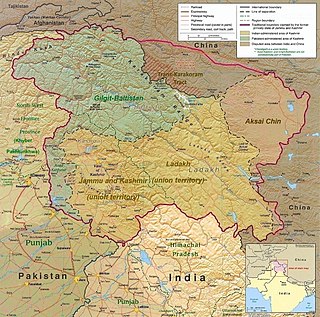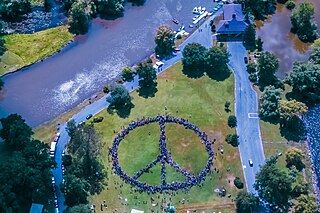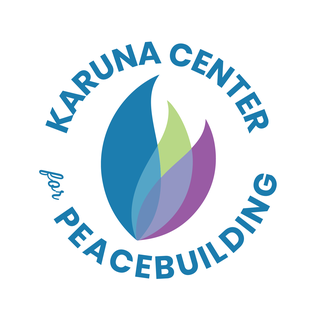Related Research Articles

The Line of Control (LoC) is a military control line between the Indian and Pakistani controlled parts of the former princely state of Jammu and Kashmir—a line which does not constitute a legally recognized international boundary, but serves as the de facto border. It was established as part of the Simla Agreement at the end of the Indo-Pakistani War of 1971. Both nations agreed to rename the ceasefire line as the "Line of Control" and pledged to respect it without prejudice to their respective positions. Apart from minor details, the line is roughly the same as the original 1949 cease-fire line.

The Centre for Humanitarian Dialogue, otherwise known as the Henry Dunant Centre for Humanitarian Dialogue, or HD, is a private diplomacy organisation based in Switzerland that assists in mediation between conflicting parties to prevent or end armed conflicts. Founded in 1999, the aim of the organisation is to promote and facilitate dialogue among the leadership of the main belligerents.

Peacebuilding is an activity that aims to resolve injustice in nonviolent ways and to transform the cultural and structural conditions that generate deadly or destructive conflict. It revolves around developing constructive personal, group, and political relationships across ethnic, religious, class, national, and racial boundaries. The process includes violence prevention; conflict management, resolution, or transformation; and post-conflict reconciliation or trauma healing before, during, and after any given case of violence.
The Irish Peace Institute (IPI) was established in 1984 by Dr. Brendan O'Regan. The Institute was created in order to promote peace & reconciliation on the island of Ireland, and to draw on the experience of conflict resolution in order to learn lessons that could inform other conflicts.
Kevin Clements is an Emeritus Professor of Peace and Conflict Studies at the University of Otago, New Zealand. He was formerly Professor of Peace and Conflict Studies and Foundation Director of the Australian Centre for Peace and Conflict Studies (ACPACS) at the University of Queensland. He has also been Secretary General of the International Peace Research Association since January 2009. Since 2016 he was appointed Director of the Toda Peace Institute, Tokyo, Japan.

The Glencree Centre for Peace and Reconciliation is a non-governmental charitable organisation located in the Republic of Ireland. Its goal is to promote peace and reconciliation within and between communities through facilitated dialogue and learning. It was founded as a response to the Troubles and its aftermath. It is housed in a complex of buildings that had many previous functions including barracks and reformatory school.
Conciliation Resources is an independent organisation working with people in conflict to prevent violence and build peace, providing advice, support and practical resources. It also takes the lessons learned to government decision-makers and others working to end the conflict to improve peacebuilding policies and practice worldwide.
Environmental peacebuilding examines and advocates environmental protection and cooperation as a factor in creating more peaceful relations. Peacebuilding is both the theory and practice of identifying the conditions that can lead to a sustainable peace between past, current or potential future adversaries. At the most basic level, warfare devastates ecosystems and the livelihoods of those who depend on natural resources, and the anarchy of conflict situations leads to the uncontrolled, destructive exploitation of natural resources. Preventing these impacts allows for an easier movement to a sustainable peace. From a more positive perspective, environmental cooperation can be one of the places where hostile parties can sustain a dialogue, and sustainable development is a prerequisite for a sustainable peace.

Karuna Center for Peacebuilding (KCP) is a 501(c)(3) non-profit organization based in Amherst, Massachusetts. The stated mission of KCP is to empower people divided by conflict to develop mutual understanding and to create sustainable peace. The organization was named for the Sanskrit word for compassion. The organizations efforts in facilitating "post-conflict reconciliation" has led to active programs in more than 30 countries. They have co-implemented programs with the United States Agency for International Development, United States Department of State, United States Institute of Peace, and Fund for Peace, among others.
Concordis International is a non-profit organisation that works alongside and in support of official peace processes, where they exist, to improve the potential for lasting peace. The organisation has headquarters in London and country-offices in the Central African Republic and in Nouakchott, Mauritania. Concordis' historical roots are in peacebuilding work by the Newick Park Initiative in South Africa (1986–91) and in post-genocide Rwanda (1994-7).
Center for Justice and Peacebuilding (CJP) is an accredited graduate-level program founded in 1994. It also offers non-credit training. The program specializes in conflict transformation, restorative justice, trauma healing, equitable development, and addressing organizational conflict. CJP is housed at Eastern Mennonite University (EMU) in Harrisonburg, Virginia, which describes itself as "a leader among faith-based universities" in emphasizing "peacebuilding, creation care, experiential learning, and cross-cultural engagement." One of the three 2011 Nobel Peace Laureates, Leymah Gbowee of Liberia, earned a master's degree in conflict transformation from CJP in 2007.

King Abdullah bin Abdulaziz International Centre for Interreligious and Intercultural Dialogue, globally known by its abbreviation, KAICIID, is an inter-governmental organization that promotes inter-religious dialogue to prevent and resolve conflict. KAICIID was opened in 2012 by the Kingdom of Saudi Arabia, the Republic of Austria and the Kingdom of Spain, following the initiative of King Abdullah of the Kingdom of Saudi Arabia. The Holy See is a founding observer. KAICIID has attracted controversy over concern with Saudi Arabia’s human rights record and restrictive domestic religious environment.

The Institute for Justice and Reconciliation (IJR) is a non-governmental organisation and think tank based in Cape Town, South Africa. It was forged out of the country's Truth and Reconciliation Commission in 2000. The aim was to ensure that lessons learnt from South Africa's transition from apartheid to democracy were taken into account as the nation moved ahead. Patron of the IJR is Archbishop Emeritus Desmond Tutu.

Hizkias Assefa (1948) is a conflict mediator known widely in Africa for his non-aligned work as a consultant who has mediated in most major conflict situations in sub-Saharan Africa in the past 20 years, as well as in a dozen countries elsewhere. He is also a professor of conflict studies. Of Ethiopian origin, he is based in Nairobi, Kenya. He was one of the founding faculty members in 1994 of the Conflict Transformation Program at Eastern Mennonite University.
Emmanuel Bombande is a conflict resolution, peacebuilding, and development professional from Accra, Ghana, and is the Chair of the Board of the Global Partnership for the Prevention of Armed Conflict.
The West Africa Network for Peacebuilding (WANEP) is a leading Regional Peacebuilding organisation founded in 1998 in response to civil wars that plagued West Africa in the 1990s. Over the years, WANEP has succeeded in establishing strong national networks in every Member State of ECOWAS with over 550 member organisations across West Africa. WANEP places special focus on collaborative approaches to conflict prevention, and peacebuilding, working with diverse actors from civil society, governments, intergovernmental bodies, women groups and other partners in a bid to establish a platform for dialogue, experience sharing and learning, thereby complementing efforts at ensuring sustainable peace and development in West Africa and beyond.
Election for the Indian state of Jammu and Kashmir were held on 23 March 1987. Farooq Abdullah was reappointed as the Chief Minister.
Women's rights in Jammu and Kashmir is a major issue. Many small organisations have been formed to struggle for women's rights in Jammu and Kashmir. The 1947 accession of Jammu and Kashmir to India has led to conflict affecting the region's women. Kashmiri women, members of a patriarchal society, have had to fight inequality and discrimination. Various scholars along with many human rights organisations state that since the onset of the insurgency in Jammu and Kashmir in 1988, rape has been leveraged as a 'weapon of war' by the Indian security forces comprising the Indian Army, Central Reserve Police Force (CRPF) and Border Security personnel. The frequent cases of rape against Kashmiri Muslim women by Indian state security forces regularly goes unpunished. they have also been victims of violence by the militants.
Peacebuilding in Jammu and Kashmir includes confidence-building measures at a nation-state level between the governments of India and Pakistan, track two diplomacy, as well as initiatives by non-governmental organisations (NGOs), institutes and individuals. The purpose of peacebuilding in Jammu and Kashmir include conflict prevention and reduction of hostilities in the Kashmir Valley. Many countries such as Russia, United States and China have also played a de-escalatory role with regard to tensions in the region.
Jonathan Luke Austin is a sociologist and political scientist. Austin is currently Lead Researcher at the Geneva-based Violence Prevention (VIPRE) Initiative, hosted by the Graduate Institute of International and Development Studies, where he is also a Visiting Professor. Austin has previously been based at the University of Copenhagen, the University of Ottawa, and the Orient-Institut Beirut.
References
- 1 2 "Centre for Dialogue and Reconciliation Information Company Profile". The Economic Times. Retrieved 28 November 2019.
{{cite web}}: CS1 maint: url-status (link) - 1 2 "Centre for Dialogue and Reconciliation (CDR)". Peace Insight. Retrieved 28 November 2019.
- 1 2 Jacob, Happymon (23 June 2019). "Understanding Kashmir: Civil Initiatives for Dialogue and Peace". The Wire. Retrieved 28 November 2019.
- ↑ "India-Pakistan dialogue resumption". DAWN. 3 November 2009. Retrieved 28 November 2019.
- ↑ "3-day cross-LoC meet on trade begins" (PDF). Asian Age. 11 July 2012. Retrieved 28 November 2019.
- 1 2 Sen, Pritha (31 December 2006). "Forging New Paths in Peacemaking in Times of Conflict and Violence". Rochester, NY. SSRN 981498.
{{cite journal}}: Cite journal requires|journal=(help) - ↑ "The Nansen Seminar 2014 - Dialogue in Peacebuilding". Nansen Dialogue Network. Archived from the original on 28 November 2019. Retrieved 28 November 2019.
- ↑ "Centre For Dialogue And Reconciliation". www.tofler.in. Archived from the original on 28 November 2019. Retrieved 28 November 2019.